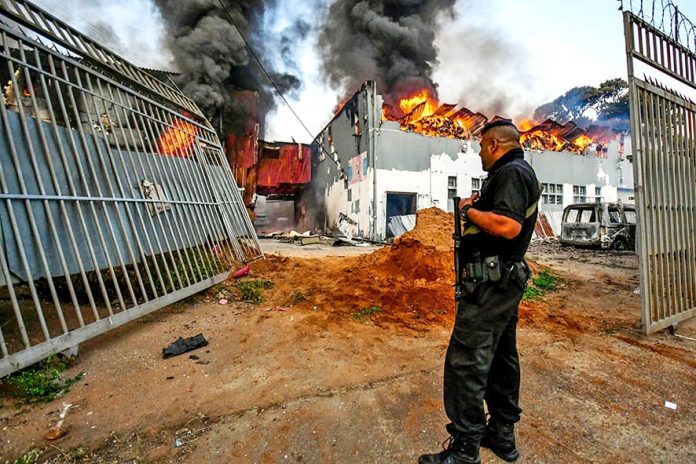The justice, crime prevention, and security cluster (JCPS) updated told the media on Thursday that more than 8 000 incidents have been reported to the police and at least 5 000 people have been arrested in connection with the civil unrest in July 2021.
The update comes a year after a wave of violence between July 9 and 18, triggered by the imprisonment of former president Jacob Zuma for contempt of court, engulfed KwaZulu-Natal and Gauteng, leading to the deaths of more than 300 people.
According to the JCPS, most of the cases were not prosecuted and others were withdrawn. The JCPS said 19 cases are still being investigated, with eight people who were arrested for incitement.
Defence Minister Thandi Modise said: “More than 3 300 cases have thus far been finalised through non-prosecution, with some being withdrawn in or before the court. Over 2 900 cases were closed as undetected or unfounded.
“There are 19 cases from which the DPCI [directorate for priority crime investigations] is investigating eight in relation to people who were arrested on suspicion of incitement to commit public violence. The investigation of about 2 200 cases is concluded pending a decision on the viability of the prosecution of the cases. A number of dockets have been referred to the directors of public prosecutions for a decision, further guidance, and direction on the matter.”
Modise said more than 2 435 cases are on the court roll with over 50 cases finalised with a guilty verdict.
Phoenix, a township outside Durban, was one of the communities wounded by the unrest. According to the cluster, the police have made successful arrests of 69 suspects who are accused of various crimes.
Thirty-six of the suspects were arrested for their alleged respective roles in the murders of 35 people, while 31 suspects have been arrested for attempted murder. Of the 164 cases investigated in Phoenix, Modise said 120 more cases are still being investigated.
Modise said the police and the Hawks continue to investigate the crimes committed during this period.
“As the ministers of the JCPS cluster, we understand that we still have a long way to go to bring the cluster to its optimal level. We are committed to do all we can to strengthen the criminal justice system, as well as capacitate our personnel to serve our people better.
“We are also engaging other countries, which have state-of-the-art criminal justice system to share some of the good practices they employ. We will adapt our methods to make sure that we serve our country effectively.
“Over and above these measures, we call upon members of our community to join community policing forums to fight crime and violence,” said Modise.
She added: “We also call on members of the community to pass on the relevant information that can assist us to fight crime and violence. Lastly, we ask members of the community not to spread harmful and false information on social media platforms.
“During the 2021 unrest, social media platforms were used to mobilise members of various communities to participate in illegal activities. Before you share information on social media, please ensure that it is truthful and builds the nation.”
In April, President Cyril Ramaphosa took responsibility for the government’s failure to combat and contain the unrest, telling the South African Human Rights Commission’s investigative hearings that the government was ill-prepared.
The president also acknowledged the intelligence’s failure, saying while there were warnings, intelligence did not anticipate what lay ahead.
“We have acknowledged that as government we were poorly prepared for an orchestrated campaign of public violence, destruction, and sabotage of this nature,” said Ramaphosa, citing his address on July 16 2021, where he explained his government’s unpreparedness at the time of the unrest.
“While we commend the brave actions of our security forces on the ground, we must admit that we did not have the capabilities and plans in place to respond swiftly and decisively.”
He told the hearings that the way the economic infrastructure was targeted entailed that the perpetrators’ intention was to bring the economy to “its knees” and to destabilise the democracy “we spent 28 years building”.
“Regardless of their intent, it was a situation for which we were not prepared. While there had been intelligence reports about the possibility of instability, neither the security services nor the government more broadly anticipated the nature, extent or ferocity of those events.
“This was a failing that we acknowledge, and which we are hard at work to address.”
The Justice, Crime Prevention and Security Cluster gives an update on 2021 July events #JulyUnrest
[Thread] pic.twitter.com/EasM1jdPXZ— South African Government (@GovernmentZA) July 8, 2022
[Photos] The JCPS Cluster provide progress on the implementation of the recommendations by the Expert Panel appointed the President @CyrilRamaphosa; criminal cases and economic impact on livelihoods, emanating from the failed insurrection #JulyUnrest pic.twitter.com/uYLyaUFbla
— South African Government (@GovernmentZA) July 8, 2022
Follow @SundayWorldZA on Twitter and @sundayworldza on Instagram, or like our Facebook Page, Sunday World, by clicking here for the latest breaking news in South Africa. To Subscribe to Sunday World, click here.



